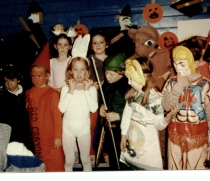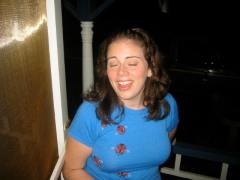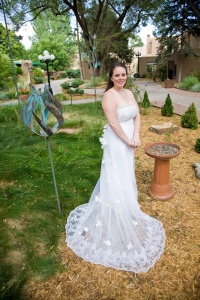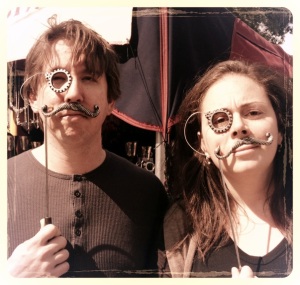We often hear people say that diets don’t work, and there are a lot of articles and research out there that explain why this is true, for example this, this, and this. And yet, so many people continue to believe that if you have a fat body, then you can make ‘choices’ which will result in you having a body that is less fat. In other words, despite the research, we continue to believe that diets do work. I am hear to tell you otherwise, but not in some scientific way. I’m here to tell you that diets didn’t work for me. And I had every opportunity…
I am lucky enough to have been born to a loving upper middle class family. They are amazing. And because they loved me they spared no expense when it came to trying to help me get thin. I could attend any weight-loss program or participate in any exercise regime. The culture taught my family that thin was necessary for happiness and success so they genuinely believed that weightloss was the best possible option and they supported any and all attempts I made to lose weight. In response, I spent the first 30+ years of my life trying not to be fat.
When I was six my mother took me to the diet center. I remember sitting in the waiting room. I remember the fabric on the chairs. It was maroon, but not much else. I remember eating rice cakes. I can’t tell you if I lost weight, I don’t remember. I do remember wanting to lose weight and understanding that my mother brought me to the diet center because they could “help” me.
Sometime around 10 I went to fat camp. At camp they provided us with portioned meals and we exercised at least six hours a day. During the summer three girls tried to commit suicide. I know that sounds outrageous but it’s true. I don’t know for sure why these girls tried to take their lives but I remember the communal feelings of desperation. I was very popular at camp because when you removed the stigma of fatness – by creating an all fat environment – people who are funny, smart and savvy can shine. I remember the pictures from the end of the summer – a thin me in a green striped top – I remember these pictures because this is one on the first times I remember feeling adorable in photos.
When I was 12 I went to another weight-loss center called 40 Carrots. Again, I went with my mom, who has always been thin – by anyone’s standard – but she has also always dieted. I remember standing in the kitchen with her weighing out 4oz of chicken, seasoning it with vinegar, dijon mustard and pepper, chopping carrots and pouring water. I remember being hungry. I also remember losing like 20lbs. I got new clothes and felt beautiful. I remember walking into French class and having a boy I’d know since kindergarten asking me when I’d changed so much.
When I was 14, I went to Jenny Craig. I lost 20lbs eating food made by nestle that quite literally has no nutritional value. I remember daydreaming about getting to the Jenny Craig “maintenance program,” where I would learn to stay thin. Instead, I gained the 20lbs I lost plus 10 more.
During my later high school years, I tried weight watchers, slim fast, atkins, nutrisystem and plain old starvation. I always lost weight and I always gained more than I lost.
I broke up with my high school boyfriend in my freshman year of college and got thin again – this time I think it was 45lbs. I don’t remember a particular program, but I remember buying a skin tight brightly colored paisley dress and wearing it so he would see what he was missing. I was fat again by sophomore year.
I was happy in college – I had great friends. But I still felt body conscious and I weighed 200lbs for the first time. For graduation I asked my parents to send me to Structure House – which is like fat camp for grown ups. At Structure House I lost 50 lbs. I gained it back .
In grad school I watch a newscast about some soap opera star who lost weight on a liquid diet – Optifast. I lost 60lbs doing this – three times – between the ages of 23 and 30.
At 30 I followed a program called Dr. Bernstein and worked out like crazy to get ready for my wedding. When I walked down the aisle I weighed 172 pounds. I look thin in the pictures but I had wanted thinner. I wasted time on my wedding day thinking about how I could have looked prettier.
Do you see a pattern? It’s not like I wasn’t committed.
When I think about my childhood, I remember crying a lot about my body. I remember feeling like a failure and not understanding why I wasn’t thin like my friends. I would have given anything to be thin, and I tried everything to be thin. I’m not going to lie to you. I have always loved food, but honestly I wanted thin way more than I ever wanted food. Each time I was thinner I loved being thinner, and I desperately wanted to stay thinner but as soon as I stopped starving and started eating normally I gained the weight back. Thin was/is not in the cards for me.
Today, I work out regularly and eat healthy but I don’t lose weight. At least I think I don’t lose weight because at this point in my life I never get on a scale and my clothes seem to fit. I genuinely believe that constant dieting made me fatter. I think that if I had accepted my body rather than diet I might have been a bit bigger than others but I never would have been as big as I am now. Diets failed me. They haunted me – they filled my life with failure because no matter how many times I dieted, I never stayed thin.
People say things like, “It’s not about dieting – It’s a lifestyle change.” Well, I’ve made a lifestyle change. I’ve decided not to diet because diets don’t work.
Plus, I’m fabulous – just the way I am.





















